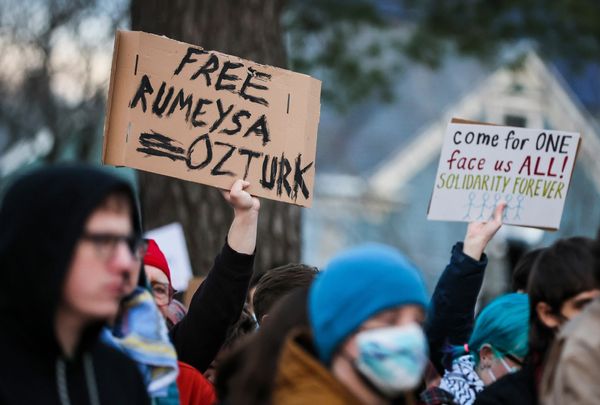
A woman without biological children is running for high political office, and so naturally that quality will at some point be used against her. Kamala Harris has, in the short period since she emerged as the Democratic candidate for US president, been scrutinised over her lack of children. The conservative lawyer Will Chamberlain posted on X that Harris “shouldn’t be president” – apparently, she doesn’t have “skin in the game”. The Republican vice-presidential candidate, JD Vance, called Harris and other Democrats “a bunch of childless cat ladies miserable at their own lives”.
It’s a particularly virulent tendency in the US, with a rightwing movement that is fixated on women’s reproduction. But who can forget (and if you have, I am happy to remind you of a low point that still sticks in my craw) Andrea Leadsom, during the 2016 Conservative party leadership election, saying that Theresa May might have nieces and nephews, but “I have children who are going to have children … who will be a part of what happens next”. “Genuinely,” she added, as if the message were not clear enough, “I feel that being a mum means you have a real stake in the future of our country, a tangible stake.”
It’s an argument about political capability that dresses up a visceral revulsion at the idea that a woman who does not have a child should be vested with any sort of credibility or status. In other comments, Vance said that “so many of the leaders of the left, and I hate to be so personal about this, but they’re people without kids trying to brainwash the minds of our children, that really disorients me and disturbs me”. He appears so fixated on this that it is almost comical: a man whose obsession with childless women verges on a complex.
But his “disorientation and disturbance” is a political tendency that persists and endures. It constantly asks the question of women who don’t have children, in subtle and explicit ways, especially the higher they rise in the professional sphere: “What’s up with that? What’s the deal?” The public sphere becomes a space for answering that question. Women perform a sort of group plea to be left the hell alone, in their painstaking examinations of how they arrived at the decision not to have kids, or why they in fact celebrate not having kids, or deliberations on ambivalence about having kids.
Behind all this lies some classic old-school inability to conceive of women outside mothering. But one reason this traditionalism persists in ostensibly modern and progressive places is that women withdrawing from mothering in capitalist societies – with their poorly resourced public amenities and parental support – forces questions about our inequitable, unacknowledged economic arrangements. A woman who does not bear children is a woman who will never stay home and provide unremunerated care. She is less likely to be held in the domestic zone and extend her caregiving to elderly relatives or the children of others. She cannot be a resource that undergirds a male partner’s career, frailties, time limitations and social demands.
A mother is an option, a floating worker, the joker in the pack. Not mothering creates a hole for that “free” service, which societies increasingly arranged around nuclear families and poorly subsidised rights depend on. The lack of parental leave, childcare and elderly care would become profoundly visible – “disorienting and disturbing” – if that service were removed.
“Motherhood,” writes the author Helen Charman in her new book Mother State, “is a political state. Nurture, care, the creation of human life – all immediate associations with mothering – have more to do with power, status and the distribution of resources … than we like to admit. For raising children is the foundational work of society, and, from gestation onward, it is unequally shared.”
Motherhood, in other words, becomes an economic input, a public good, something that is talked about as if the women themselves were not in the room. Data on declining birthrates draws comment from Elon Musk (“extremely concerning!!”) . Not having children is reduced to entirely personal motivations – selfishness, beguilement with the false promise of freedom, lack of values and foresight, irresponsibility – rather than external conditions: of the need for affordable childcare, support networks, flexible working arrangements and the risk of financial oblivion that motherhood frequently brings, therefore creating bondage to partners. To put it mildly, these are material considerations to be taken into account upon entering a state from which there is no return. Assuming motherhood happens without such context, Charman tells me, is a “useful fantasy”.
It is a binary public discourse, obscuring the often thin veil between biological and social actualisation. Women who don’t have children do not exist in a state of blissful detachment from their bodies and their relationship with maternity: a number have had pregnancies, miscarriages, abortions and periods. A number have entered liminal stages of motherhood that don’t conform to the single definition from which they are excluded. A number extend mothering to various children in their lives. Some, like Harris herself, have stepchildren (who don’t count, just as May’s nieces and nephews didn’t). A number have become mothers, just not in a way that initiates them into a blissful club. They experience regret, depression and navigate unsettlement that does not conform to the image of uncomplicated validation of your purpose in life.
But the privilege of those truths cannot be bestowed on creatures whose rejection of the maternal bond has become a rejection of a wider unspoken, colossally unfair contract. Women with children are handed social acceptance for their vital investment in “the future”, in exchange for unrewarded, unsupported labour that props up and stabilises the economic and social status quo. All while still suffering sneeriness about the value of their work in comparison with the serious graft of the men who win the bread.
On top of that, women have to navigate all that motherhood – or not – entails, all the deeply personal, bewildering, isolating and unacknowledged realities of both, while being subject to relentless suffocating, infantilising and violating public theories and notions that trespass on their private spaces. With that comes a sense of self-doubt and shame in making the wrong decision, or not being as content with those decisions as they are expected to be. It is a constant, prodding vivisection. That, more than anything clinical observers feel, is the truly disorienting and disturbing experience.
Nesrine Malik is a Guardian columnist







